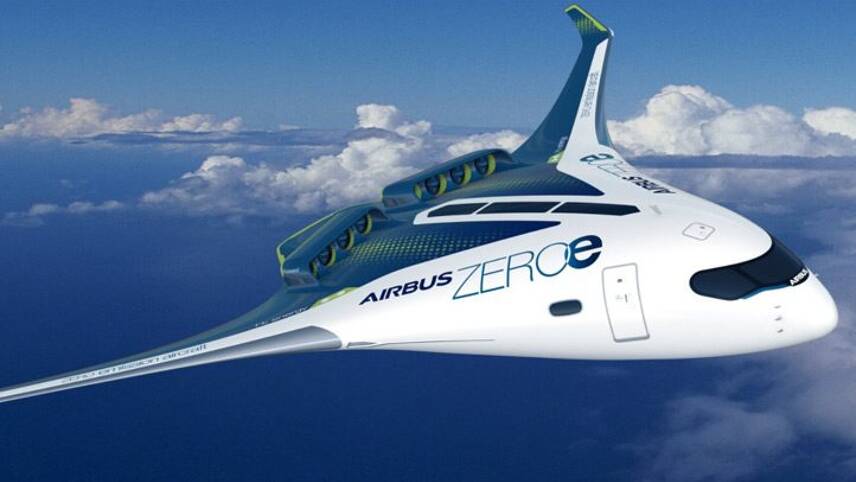Register for free and continue reading
Join our growing army of changemakers and get unlimited access to our premium content

Pictured: The third ZEROe concept. Image: Airbus
Airbus said in a statement that it believes hydrogen “holds exceptional promise as a clean aviation fuel” and has been working to design the concepts for several months.
The first of the designs is a 120-200 passenger jet with a range of more than 2,000 nautical miles, which it claims could decarbonise trips between continents. It features liquid hydrogen storage tanks and a modified gas-turbine engine that is compatible with hydrogen rather than traditional kerosene-based jet fuels.
The second is a smaller aircraft capable of transporting up to 100 passengers on short-haul trips of 1,000 nautical miles or less. It is fitted with systems that combust hydrogen in modified gas-turbine engines.
Of the three designs, the last is by far the most futuristic – a diamond-shaped aircraft in which the fuselage (body) is extremely wide and “blends” with the wings. It is powered in a similar manner to the second design.
Airbus has called the range of aircraft ‘ZEROe’ – short for zero-emission. It has said that governments and airports will need to provide “significant” investment in green hydrogen generation infrastructure and hydrogen transport and refuelling systems if the designs are to become a commercial reality in the coming decades. On the former, less than 1% of the hydrogen produced in 2019 was made using 100% renewably-powered processes, according to Wood McKenzie.
Nonetheless, the firm’s chief executive Guillaume Faury said that the shift to hydrogen aircraft and other alternative power sources will mark “the most important transition the aviation industry has ever seen”.
“I strongly believe that the use of hydrogen – both in synthetic fuels and as a primary power source for commercial aircraft – has the potential to significantly reduce aviation’s climate impact,” he added.
The announcement from Airbus comes as a consortium of businesses including Ørsted and Copenhagen Airport work to develop a hydrogen fuel facility in the heart of the Danish capital in stages through to 2030.
Fuel for thought
In related news, Malta-based business aviation company VistaJet has unveiled plans to help the industry scale up its use of sustainable aviation fuel (SAF) – an alternative to jet fuel made using feedstocks such as used, bio-based oils and agricultural waste. In 2019, SAF accounted for around 0.1% of the fuel consumed by the airline industry.
It has partnered with SAF supplier SkyNRG to offer SAF to its customers, in the hopes that this will scale up demand and, in turn, production and related infrastructure.
VistaJet claims that it has already reduced the fuel consumption of each of its flights by 8% since January 2020 by optimising flight processes and implementing digital fleet management technologies. Improved fleet management has also resulted in 20% fewer movements of aircraft between London’s airports on a monthly basis. As such, SAF forms part of a broader decarbonisation strategy.
VistaJet’s founder and chairman Thomas Fohr said the new commitments and partnership mark a change in the way the business operates.
“In this spirit, I hope our private aviation partners and peers will do the same, working collaboratively to bring change faster, as this is the only way for the fragmented industry to take full responsibility for the long-term health of the planet,” he said.
VistaJet’s announcement came in the same week that Shell signed an agreement with fuel firm Neste which will see the companies collaborate to scale up production and distribution infrastructure for SAF.
Fuelling the debate
Many airlines, fuel firms and thought leaders see SAF as part of the aviation industry’s decarbonisation puzzle. The UK Sustainable Aviation Coalition recently published a roadmap for the net-zero transition centring heavily on SAF development, for example. Standalone business commitments to SAF have been made by the likes of Amazon and British Airways.
Nonetheless, the fact that SAF is currently such a small market means there will be challenges scaling rapidly enough. Moreover, critics have argued that airlines may use SAF to downplay the importance of investing in electric aircraft and working with governments to ensure that passenger numbers do not grow beyond the limits of climate targets. Businesses which remain sceptical about SAF include RyanAir.
To help ascertain how to reshape the policy landscape for aviation in the wake of Covid-19 and in light of the 2050 net-zero target, the UK Government is assembling a coalition of Ministers, businesses, trade bodies and environmental groups who will develop policy recommendations for addressing the sector’s finances and environmental impact. It is called the ‘Jet Zero Council’.
Sarah George


Please login or Register to leave a comment.